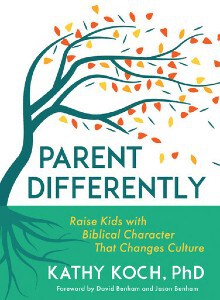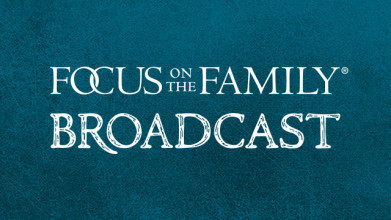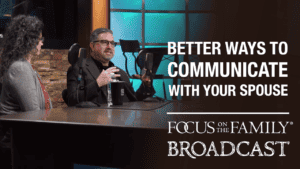Dr. Kathy Koch: If I s- prioritized obedience, I can actually create negative character. Because the kid’s alive, because they don’t want to be punished. They’ll cheat because they have to earn an A because their dad has stressed them out so much. They- so they end up exhibiting negative character qualities to maintain a look of obedience, which adds to the pain of the heart.
Jim: Yeah.
Kathy: And now they’re in their room crying. Or now they’re irritable and critical, and negative and argumentative. And we wonder why. Well, it’s because we created this scene that obedience is what we celebrate here. We celebrate a transformed heart, relying on the Holy Spirit, which means we’ve got to be praying for our kids.
John Fuller: Dr. Kathy Koch joins us again today on Focus on the Family. Your host is Focus president and author Jim Daly. And I’m John Fuller.
Jim Daly: John, one of the things as a parent, especially as the kids are out of the house, or almost out of the house, wherever you’re at in that journey, so many of us with older children are saying, “Ah, I wish I could get that do-over.”
John: Mm-hmm.
Jim: Right?
John: Mm-hmm.
Jim: “If I could just do a few things differently, I think- I think the results would (laughs) have been better.”
Hey, today we’re gonna talk with a very special guest who will give you in that parenting seat, some great advice to concentrate on character development, uh, even more than behavior. And that’s the cornerstone of what point we want to make.
John: Mm.
Jim: And Kathy Koch has done a fantastic job in her book Parent Differently. It’s natural in our culture to want to aim at behavior. Because it makes us as parents look good.
John: Mm-hmm.
Jim: That the kids are buttoned down, they do everything well. But underneath that, if they don’t have the character driving that behavior, whoo, you’re gonna be in trouble when those kids go off to college or leave the home for anything as young adults.
John: Yeah. Yeah. It- there was so much good content in the last episode, and if you didn’t get a chance to listen or watch, uh, at our website, we’ve got links to the app, uh, to the YouTube channel, and, uh, other places that you can listen. Uh, Dr. Kathy Koch is a passionate champion of children, and is the founder and president of Celebrate Kids. She speaks to parents and educators, even children themselves. And her latest book, um, is called Parent Differently: Raise Kids with Biblical Character that Changes Culture.
Jim: Ka-bang! (laughs)
John: It’s a terrific resource.
Jim: (laughs)
John: Uh, get a copy from us and, uh, and you’ll have a- a different parenting outlook. Uh, the details are at focusonthefamily.com/broadcast.
Jim: Man, I just love the title. Because that’s what we want as Christian parents: our kids to be equipped to change the culture in front of them, right? For God’s glory, which is a good goal.
Kathy, good to have you back.
Kathy: I’m so glad to be here.
Jim: (laughs) I’m so excited-
Kathy: Thank you.
Jim: … to sit with you a second day. And if people missed day one, they need to go back and- and listen to it. Because there’s so much rich advice. Let’s kick it off, let’s go right into a question that I couldn’t get to last time. And that is, you know, biblical character versus Christlike character. Aren’t they one and the same?
Kathy: No. Thank you so much for asking.
Jim: (laughs)
Kathy: I don’t think they’re the same.
Jim: A lot of people are scratching their heads, going, “Yeah, they should be the same.”
Kathy: Well, one of the reasons I label it biblical character is I think the Old Testament and the New Testament are both important. I think the Scripture is full of so many examples for character: not just Jesus. Obviously, Jesus Christ ought to be the role model of all that we become. And there’s also Esther and Daniel and Paul and Moses and David and, hello, Caleb, and Ruth, and so many who exhibit the qualities that we would want for our lives and for our kids. And let’s call those out. Those people are in the Scripture on purpose. And we can draw from them great lessons about character. God’s way and God’s will for us, not just Christlike, but biblical.
Jim: Well, let me interject there, Kathy.
Kathy: Yeah.
Jim: It’s really funny when you look at the characters of the Bible. Because you may not want to emulate their early lives. (laughs)
Kathy: Right. ‘Cause that’s easily to talk about-
Jim: God is dealing with people that are not … They’re kind of messed up.
Kathy: Mm-hmm.
Jim: You know, think of Paul. His great conversion.
Kathy: Yeah.
Jim: On the Damascus Road.
Kathy: Yeah.
Jim: I mean, he was a zealot, killing Christians, going after them, doing it out of his religious conviction. And then boom, Jesus gets ahold of him.
Kathy: Mm-hmm.
Jim: Then, it’s a good man to emulate.
Kathy: And then he has a thorn in his side.
Jim: Right.
Kathy: But he doesn’t give up or give in. I- there’s- it’s not recorded that he sits down and complains all day. And he doesn’t do what he’s called to do. Same thing with David. You know, there’s bumps in the road (laughs) for David’s life, for sure. But he’s called out for be- having a heart for the Lord. So let’s teach our kids that yesterday is yesterday. And today can be amazing.
Jim: Yeah.
Kathy: And then there’s fruit of the spirit, and Micah 6:8 and the one anothers of the New Testament. And just so many passages that we need to be using to train up our children, to be who God’s created them to be. So that’s why it’s biblical character.
Jim: And- and then speak to the emphasis of Christ-centered character.
Kathy: Definitely.
Jim: (laughs)
Kathy: How they’re censured.
Jim: I want to make sure that is dominant here.
Kathy: Yeah. I mean, how they’re censured, humbled, um, carrying the cross all the way to the finish line. So he’s the example of perseverance, diligence, effort, humility, teachability, even Jesus. Um, just so much that’s there for us.
Jim: Mm, I- I was gonna say that, you know, there’s always this conflict, it seems, between truth and grace. And of course, Jesus was all of that. But so often, when we look at the fruit of the spirit, love, joy, peace, patience, goodness, kindness, neatness …
Kathy: Mm-hmm.
Jim: And we’re going, “Oh, though- those aren’t really competitive, win, zero sum game attributes.” (laughs)
Kathy: Mm.
Jim: They’re the exact opposite. And they tend to war against our fleshly nature.
Kathy: Sure.
Jim: So- so, you- how do you- you’re teaching a 12-year-old, okay?
Kathy: Hm.
Jim: (laughs)
Kathy: Critical- critically important. And let’s- for, like, meekness isn’t weakness, like my pastor teaches. We’ve got to teach the words. And you guys, you have to use the words. And- and use them well and catch our kids being good. And don’t just say, “Hey, you were good,” but say, “I noticed that you took a back seat and you let your brother shine in his moment. I’m so proud of you.”
Jim: Hm.
Kathy: “For not indicating that you were jealous or afraid or disappointed. But you celebrated your brother, and that- that’s our value that we’re a family that is together in unity. And thank you for showing us that today.”
Jim: Yeah. Kathy, uh, the practical side of all this: let’s kick off where we left off last time, and speak to, uh, the core needs that our children have.
Kathy: Mm-hmm.
Jim: I think every parent should memorize these.
Kathy: Oh, thanks.
Jim: But what are those core needs that children have, and that we as parents need to a- answer so that they can be healthier?
Kathy: Right. So security, “Who can I trust?” First and foremost. It’s the firm foundation I pray. And then identity, “Who am I?” We have to know who we are. By the way, we have an identity crisis in our culture.
Jim: Terrible.
Kathy: We have a security crisis.
Jim: Right.
Kathy: When kids don’t know who to trust and who to listen to and who to believe, but go wherever the wind blows them. And then belonging, “Who wants me?” Purpose, “Why am I alive?” And competence, “What do I do well?” I mean, one of the points I make in the book is that it’s our character that causes these needs to be met. Now it’s primarily God, the triune God. God, Jesus, the Holy Spirit meets these needs. And yet we also have a role to play. So when children are discerning, they can be secure. When children are honest, they can have a healthy identity. When children are helpful and friendly and loyal and dependable, their friendships become better, and they won’t be angry that they’re lonely all the time. When children have hope and optimism and other-centeredness, they’ll believe that they were created on purpose. And they won’t succumb to the doubt and to the negativity in our culture. And when they have skills and ability, and they’re careful and they persevere, and all of that, then they have competent. And they can be who God’s created them to be. So character matters. It- it matters tremendously, because these are why we are struggling. And character is a way to settle them.
Jim: Hm.
Kathy: I- it does. It does.
Jim: Yeah. It gives them confidence.
Kathy: And then for kids as well. Makes sense?
Jim: Absolutely it does. You refer to something called the pyramid effect.
Kathy: Yeah.
Jim: Related to this. What- what’s the pyramid effect, and how do we apply it for children’s character?
Kathy: Yeah, I appreciate that question. So let’s go to identity. Identity is, “Who am I?” So do kids define themselves as, “I respect myself. I- I use effort without fear. I’m brave. I’m honest. I’m- I’m patient with Grandma. So identity, then that allows me to be secure in myself, because I know who I am.” And so it goes down the pyramid. Not instead of God, but in addition to God, “I know who I am. And I don’t have to have someone looking at me to make me be good. I can be good because I’m good. Because God is changing my heart because the Holy Spirit is real in my life. “And then my belonging will be healthy, because I’m agreeable and I’m patient and I have hum- I have humil- I have humility, and I respect myself. “And then if I have belonging, I have people to serve, and I’m in healthy relationships. Then I believe I have purpose because we live out our purpose by influencing others.”
Jim: Mm-hmm.
Kathy: That’s how character changes culture, by being influential with other people. And then our competence comes again from that identity. That, “Okay, I respect myself. I have self-control. I- I’m brave. I’m compassionate. I’m careful. I’m diligent. This is who I am, and this is who I’m going to show up. “So there’s a spelling test, there’s a math test, there’s a piano recital. There’s an opportunity to s- shovel snow at the neighbor’s,” like we talked about yesterday. Or the example of shoveling manure that you talked about yesterday.
Jim: (laughs) I should’ve thought of snow, but it didn’t happen. (laughs)
Kathy: Well, that’s a real example of doing hard things that we don’t necessarily want to do. But by the way, when I ask young people how you find your skills, your passions, your talents, and your delights: by serving. I can’t tell you how many young adults and how many teenagers have raised their hands-
Jim: Yeah.
Kathy: … to tell me that when they served, when they initially did not want to do what Dad told them to do, they found themselves. And why? Because character shows up when you’re in a difficult place, or not.
Jim: Yeah.
Kathy: But it often does, because you’re raising your kids to be well and do well when no one is looking.
Jim: In fact, that kind of leans into the next question: what are the strengths that our children may possess? How do we identify them? And then how do we encourage them to use them in everyday life?
Kathy: Yeah, it’s such an interesting question. I’ve been on the broadcast before to talk about how kids have so many strengths. But how many of us have found that their strengths get them into trouble, right?
Jim: Yeah. (laughs)
Kathy: So as an example, the three of us are word smart and we can talk up a storm. But too much talking isn’t good when you’re supposed to be listening. So what-
Jim: Have you been talking to Jean?
Kathy: No! (laughs)
Jim: (laughs) That’s something she might recommend to me.
Kathy: I live with myself, (laughs) you know?
Jim: (laughs)
Kathy: But we- we need self-respect so that we believe that we are worthy of biblical character. And we want to use the qualities well, because we respect ourselves. And we need self-control so we can use the qualities well, so that Chatty Cathy is able to be quiet and put listening first, because I put other people above myself. And then the third quality that’ll change us is respect for others. Because character shows up in relationship. I don’t want biblical character so that I’m known to be a good person. I want biblical character to show that God is on display, and so that people are loved and honored and helped and delighted and full of joy and gratitude. If we can spend time with people and change them, again, we change culture. So self-respect, “I’m a person worthy of biblical character. Mom and Dad need to teach me who I am because I matter.” Self-respect. Not, “I’m better than you are. But I’m capable of wow, wait until I grow up.” Right?
Jim: (laughs)
Kathy: And then self-control, “So that I can use all the strengths in good and honoring ways.” And self-control is, um, being able to use the strengths for good and not evil. And it’s impulse control. Imagine this.
Jim: Hm.
Kathy: Where kids don’t, uh, automatically do what they could do, but they slow down and they stop a moment and wonder if it would be good for them.
Jim: Kind of front-brain context.
Kathy: Yeah. And you know what?
Jim: Judgment.
Kathy: Yeah. And another thing about self-control that I found really interesting: if you think about it this way, when we are self-controlled, we are making decisions based on values, not circumstances.
Jim: Mm.
Kathy: So we’ve got to teach our children our values. “In our family, we do things this way.” So now when they’re out and about and we’re maybe not there, and they could be tempted to do or be somebody, they’re thinking, “Wait. But my family values.” So that’s self-control.
Jim: Yeah.
Kathy: It’s so rich. And again, the third one, respect for others: “So that I want to use my strengths only to bless other people.” Those three, along with joy, gratitude and self-efficacy, if we just do those six, we’ll be doing a really good work for the life of our kids.
Jim: Yeah, that is so good. And so doable, right?
Kathy: It is.
Jim: It’s not impossible.
Kathy: No, we- we have to slow down and want it for ourselves and our kids.
Jim: What it says, you know, to become … So many say to become a student of your child.
Kathy: Yes.
Jim: That’s what this is talking about. Uh, you’re working on your doctorate, uh, just a few years ago.
Kathy: (laughs)
Jim: And, uh, and you’re thinking, “Okay, I’m- I’m starting to gain this knowledge.” And then Jesus, like He often does through the Holy Spirit, decides to teach you a little lesson.
Kathy: (laughs)
Jim: While you’re (laughs) working on your doctorate. What happened, and what did He teach you?
Kathy: Oh, it’s so fun to talk about this. So, yeah, forever ago, earning a PhD. And one of my assigned topics was effective teaching. So I was assigned certain books and then I could choose certain resources that I wanted. I went back- all the way back to the 1800s and the one-room schoolhouse: what made a teacher good?
And then no joke: like, the Holy Spirit whacks me upside of the head. And He’s like, “You might want to study Jesus. He was the best teacher who ever lived.”
Jim: (laughs) Good.
Kathy: Right? I mean, think about it. Because w-
Jim: And you were at a secular college.
Kathy: I was at a secular college.
Jim: Yeah, this was even better.
Kathy: So I had to be really careful. And yet, you know, Jesus, we’re still teaching what Jesus taught. And He was just profoundly gifted at this. And the thing that struck me was He was different from everyone around him because of the beliefs He had about His students. Whether those were the learned, the- the- the men, the women, but the children. The children, back when Jesus walked on Earth, were the forgotten generation. You know?
Jim: Mm.
Kathy: They were swept behind Mama’s skirts. Nobody paid attention to them until their moment of becoming adults. And yet, when the learned men, like, “Who among us is the greatest?” Jesus called a child out. And I pictured him then, mumbling, “Did He hear the question right?”
Jim: (laughs) Yeah, I can imagine.
Kathy: Because can’t you see the look on their faces?
Jim: Yeah.
Kathy: Like, “Wait a second!”
Jim: “That can’t be true.”
Kathy: No. And then Jesus w- when, you know, the- the disciples- the people wanted to bring children to Jesus. And the disciples rebuked the people. And Jesus said, “No, let the little children come to me.” You guys, Jesus was more important than we’ll ever be, with a more important agenda than we’ll ever have, busier than we will ever be. And He said, “Let the little children come to me.”
Jim: And if you continue in that Scripture, it says, “Because in essence, they thirst for Heaven.”
Kathy: Yes.
Jim: “They thirst for the kingdom.”
Kathy: Yes.
Jim: And that child’s attitude, that child’s, you know, pure want-to-learn nature. You know?
Kathy: For us to not get in their way, right?
Jim: Yeah.
Kathy: Which is so challenging.
Jim: And I think that’s what Jesus was going after. These kids are acting like the kingdom.
Kathy: Yes!
Jim: That is this- this sponge that wants to be filled with truth.
Kathy: I love that.
Jim: And I think it’s so good.
Kathy: And I want us to believe those things for our children. And I want us to understand that when children know they’re valued, they’re teachable.
Jim: Yeah.
Kathy: When children know that they matter to you, they’re not an inconvenience. They’re not in your way. But they matter to you, then you earn the right to teach these hard things like respect for others and putting others first.
Jim: It- it’s kind of odd to think of that, though. That Jesus was saying, “These kids have better wisdom than the Pharisees and the scribes.” (laughs)
Kathy: Seriously.
Jim: “They’re the learned ones.” That’s pretty interesting.
Kathy: And I think another point, real quick, is that to teach the novice is often easy, right?
Jim: Yeah.
Kathy: Like, I’m s- I do believe that any adult listening to us can learn these qualities. Character is always something that we can become better at. And yet, to teach the one who doesn’t know much is easier, because you don’t have to start from a bad platform. You can start from scratch.
Jim: Right.
Kathy: And I think that’s another thing Jesus was maybe teaching them.
Jim: They’re kind of humble.
Kathy: They’re humble.
Jim: (laughs)
Kathy: They’re- they’re available to who you are and what you have to say.
John: Yeah. Yeah. This is Focus on the Family, with Jim Daly. And, uh, our guest today is Dr. Kathy Koch. And she has a terrific resource that’s called Parent Differently: Raise Kids with Biblical Character that Changes Culture. And we have copies of that book here at the ministry. Stop by focusonthefamily.com/broadcast, or call 800, the letter A, and the word FAMILY.
Jim: Okay, Kathy, this next question (laughs) is so close to my inadequacy, it hurts to ask it. But I need to.
Kathy: Okay.
Jim: And that is, uh, you know, getting practical on how we can teach character to our kids: why is it important to not overprotect our children?
Kathy: Mm. Mm.
Jim: I tend to do that. I really do. It’s one- it is my parenting weakness.
Kathy: I appreciate your humility. It’s a great quality that you have.
Jim: (laughs)
Kathy: And there’s others who are absolutely in your space.
Jim: I’m thinking 80% of us as parents- (laughs)
Kathy: Yeah.
Jim: … quite fit this.
Kathy: Yeah. And- and sometimes it’s because we don’t want to look bad. And it’s sometimes because we- we really don’t want our kids to hurt.
Jim: I would say mine is just I don’t want them to go through the pain I went through.
Kathy: Yeah. Yeah.
Jim: So the- the idea is noble, but the outcome may not be so noble.
Kathy: (laughs) Exactly. Because w- if I ask you, “Did you gain anything from the difficulties?” You would say “Yes.”
Jim: Yeah, (laughs) right.
Kathy: You know, if we read Romans 5 and James 1, we read that walking through the difficulties is what gives us more of a biblical character and also more of an awareness of who God is for us. When I ask my audiences, “How many of you have better character and greater faith because of the challenges?” The hands go up. And also when I ask, “Do you value greater the things you’ve worked hard for?”
Jim: Absolutely.
Kathy: Every hand goes up.
Jim: Yeah.
Kathy: So we ke- if we overprotect, they lose.
Jim: Yeah.
Kathy: So we need to back out. And we need to leave the room, and we need to let consequences do their work. Now, please make sure you understand me. I’m not saying, “Watch a kid get hit by a car.” You know what I mean?
Jim: Yeah.
Kathy: If your kid’s gonna run out- out into the street, yell, “Stop!” Don’t stand by.
Jim: Or spiral down.
Kathy: Yeah, or spiral down.
Jim: Addictions or something.
Kathy: Yeah.
Jim: Get in there.
Kathy: Don’t stand there and go, “What would- what would Dr. Kathy wanted me to do?”
Jim: Yeah.
Kathy: No, but, in the day-to-day living of life, they need to suffer the consequences of their choices. If they don’t study, they earn a C. It wasn’t the teacher was mean, they earned a C because they forgot to study. If they don’t grab a jacket, even though you told them it’s gonna be windy by the time they come home, and they get cold and they complain, you look ’em right in the eye: “You chose to not believe me. And you chose to not bring a jacket. You’re suffering the consequences of your decision. I hope next time you’ll listen to me.” These are the real conversations that we have to have.
Jim: (laughs) No, it’s true. I’m laughing because I did all those backwards.
Kathy: (laughs)
Jim: (laughs) “I’ll run that jacket down to you. Don’t worry. You need to be warm.”
Kathy: And you know what, Jim? A little bit of that is fine.
Jim: Yeah.
Kathy: A little bit of grace and mercy goes a long way.
Jim: It does demonstrate those characters.
Kathy: A- absolutely. You know, “I love you enough to do this for you today. Don’t count on me all the time.” And then we- we teach the kids that- that policy, if you will.
Jim: Kathy, also in the book, you mention four ways to communicate in a helpful way. (laughs)
Kathy: (laughs)
Jim: And I think that’s good emphasis, in a helpful way. There’s lots of unhelpful ways-
John: Mm-hmm.
Jim: … we parents can communicate. “What did you do?”
Kathy: (laughs)
Jim: “I cannot believe you did that!” That is an unhelpful example.
Kathy: I would agree.
Jim: And John, you have a helpful one?
John: Uh, I can only aspire to what you just said.
Jim: “Maybe you can do better next time, sweetheart.” Something like that. But-
John: Yeah.
Jim: Anyway, get to the point there on, uh, helpful ways.
Kathy: One of my favorite ways to teach character to children is to use the word “choice.” Because every behavior starts with choice, and all choices are rooted in a worldview, which is why we want it to be a biblical worldview.
Jim: And you’re saying use that word?
Kathy: Absolutely.
Jim: Yeah.
Kathy: You know, “You chose to slam the door.” “No, it just slipped.” “No, you chose to slam the door. Doors don’t slam on their own.” You know, “You chose to talk back, which demonstrates a disagreeable spirit. You know, “You chose to not study. You chose to cause your child- your sister pain.” “No, no I didn’t.” My favorite is to say to a kid: a child came to me and said, “My parents said I’m disrespectful. But I don’t know what I’m doing that causes them to think I’m disrespectful.” So I talked about, “Do you argue? Talk back? Always have a better idea? Push the chair into the table? Do you roll your eyes?” And this nine-year-old boy says to me, “Well, yeah, but my eyes just roll.”
Jim: (laughs)
Kathy: No, seriously.
Jim: “I’m not controlling them.” (laughs)
Kathy: Yeah.
Jim: (laughs)
Kathy: And I’m like, “No, you- you tell them- there’s a belief system you have that’s telling your eyes to roll?” “No, they just roll.” So I stared him down, and I said, “Okay. I want your eyes to roll without you telling them to roll.” And I just stared him down. And of course he couldn’t do it.
Jim: Oh …
Kathy: And he ends up just laughing. And that was the way that I taught him that he’s choosing a belief that causes an external behavior that’s observable. “So you chose to roll your eyes. S- so why did you do that?” “Well, my dad doesn’t understand me.” “Well, let’s talk about that. What do you want him to understand about you, so that you can respect his input?”
Jim: Yes, that’s so good.
Kathy: Meaningful conversations. The word “choice,” very powerful. “What did you- what are you going to choose to do? What choice will you make? You chose to talk back. You chose to cheat.” “Well, no, but everybody around me-” “You chose to cheat.” Put it on them, you guys. As hard as that is, if they don’t understand that they made decisions, they won’t know that they can change their decisions.
John: Yeah, there’s an empowering here for parents-
Kathy: I love it.
John: … to equip their kids to understand that in the background, there’s always something that they can choose to do, right?
Kathy: Yes.
John: ‘Cause I think, I think I was guilty of- of kind of prescribing, “This is what you do.” And I’ve gotten to a point in my ripe old age of saying, “Well, you can choose to do that.” And letting go of the consequences.
Kathy: Yes. Let the consequences do their work.
John: Yeah.
Jim: So there’s three more. What are they?
Kathy: Right. I like the phrase, “You are being careful, you are being diligent, you are being other-centered.” Because in reality, we are not something 24/7/365. As much as I wish that we were. So if you say, “You are careful,” it sounds like they are consistently careful. But when you say, “You are being careful,” it reinforces the word “choice.”
Jim: Hm. And it’s action, not character.
Kathy: I love it’s- it’s character showing up in action, and verbal.
Jim: Yeah, but what I mean is sometimes as parents because we don’t do that, we’re- it feels like to the child we’re attacking them.
Kathy: Oh, yeah. Good point.
Jim: Their person.
Kathy: Their person. Right.
Jim: Rather than the behavior.
Kathy: Right.
Jim: So when you’re saying, “You’re being-”
Kathy: Yeah.
Jim: … you’re actually going after the- the behavior and not them as the person.
Kathy: Yeah, I love that. Yeah, so, “You’re being lazy.” “Well, no I’m not.” “No, you are being lazy. You are choosing to sit and just veg in front of the game while everybody else in the family is busy taking care of business. And you’re watching us.”
Jim: As opposed to saying, “You’re lazy.”
Kathy: Right.
Jim: Right.
Kathy: Because doesn’t that sound just more like, terrible?
Jim: Yeah.
Kathy: So, “You are being …” and then a good quality, and “You are being …” a negative quality. And you follow up with that. I think that’s really powerful and hopeful. And then another thing that I write about in the book, I’ve written about in other books: and that is the benefit of specific compliments and specific corrections. So again, using the right words. So instead of saying, “You are good,” which is just almost a non-word; “good” means I’ve judged you and I’m happy, but it doesn’t allow them to do it again.
Jim: Right.
Kathy: We can say, “You are generous, you are outgoing, you are compassionate. You are being careful. You are being- you are being compassionate. You are being careful.”
Jim: Much more specific.
Kathy: It is. And it allows the kids … Back to that word “empowering,” they want to be well. So many of my kids, they- they tell me, “I don’t mean to be a problem, Dr. Kathy. I want to be well.” And so they need to know. And the same thing with the specific correction. It doesn’t help a kid to say, “I don’t want any more of that attitude.”
Jim: (laughs) Right.
Kathy: I had a kid look at me once-
Jim: Which attitude is it?
Kathy: “It’s the only attitude I have. I’m in big trouble.” You know?
Jim: (laughs) I didn’t even know I had other cards in the deck.
Kathy: Yeah.
Jim: (laughs)
Kathy: And so, rather than just being disagreeable, choose to be agreeable, here’s how you can do that.
Jim: Yeah.
Kathy: So being specific in our language. But again, you guys, it means that we slow down, and that we’re careful observers. And that we have the heart of our children in mind.
Jim: Oh, that’s good. So good. Speaking to, uh, teaching connected qualities. Now, we’re talking about your PhD language.
Kathy: (laughs)
Jim: What- what is the idea of teaching connected qualities?
Kathy: This was the, um, this was exciting to me. You know what? I don’t write because I like to write. Good heavens. I like to think. I like it when the spirit delivers new insight. And no joke: back to something we talked about in the first episode, when I was in line at the airport and my luggage had been lost, and I was- I was discouraged. And I started to almost complain like everyone else around me. But I realized that it wasn’t just that I was patient, which allowed me to be quiet. I’m optimistic. I’m op- I put others first. I tend to think well of people. And I’m- and though it’s a connected thing, there’s- there’s a web of traits related. So as an example, forgiveness. If we want our children to learn the quality of forgiveness, which is so rich, they have to be humble. They have to be other-centered. They have to be brave. If you want children to be patient; and I’ve used that example a lot today, because impatience is prevalent in our culture today because of technology. Everything’s easy, quick, and about me. You want your kids to be patient, that requires that they have compassion for people around them. That they recognize the situation they’re in. “So I’m gonna slow down and- and not make them more irritable. I have to be cooperative. And be a part of the team, whether that’s school, family, or church. I need to be flexible; flexibility is one of my top 48. Not rigid; I’m going to do it my way or the highway; but flexible. “So Grandma’s sick and we can’t go. I’m not gonna complain all day. She’s probably more unhappy than I am.
Jim: Hm.
Kathy: “And I’m gonna choose to be flexible, which then allows me to be patient in my situation.” So again, what I want from- for the reader here, Jim, is they see a quality they want to instill in their children, and it’s legit. Generosity. I was stunned at how important generosity is in the research. Let’s say I want my kids to be generous with their spirit and their stuff and their time and their- their passion. What are the other things that would need to be addressed? And maybe as a family we sit down. And family values; our whole family wants to become more generous. What are the other qualities that are gonna be related to that, that we need to look for, build up and talk about? And it makes it, I think, less overwhelming because we don’t have to teach 48 qualities like we teach the ABCs separately.
Jim: Yeah.
Kathy: We can teach them together, and it makes us rich. It makes it more likely that we will become more like Christ and exhibit this biblical character that I- I want them to parent differently for.
Jim: That’s so good.
Kathy: I hope so.
Jim: And, uh, you can get a copy of this book. I’m gonna make it super easy. Why don’t you join us in ministry? Either make a one-time gift or a monthly gift, and we’ll send you a copy of Kathy’s book, Parent Differently as our way of saying “Thank you” for being in ministry with us. And if you can’t afford it; I often say this; just get in touch with us. We’re gonna trust others will cover the cost of that. Maybe you’re in a position to do that. So help us get this resource out to more people. And you know, thousands of people reach out every day to Focus on the Family for that help. Couples heading for divorce, parents who are stressed, and others who just have other difficulties. You can come alongside those folks and give families hope through your financial support of Focus on the Family. God will use your support to provide biblical resources and programs to save and strengthen families just like yours.
John: And right now we have a special match opportunity going on, in which your year-end gift is doubled, dollar for dollar. And twice as many individuals and families can experience healing and redemption, thanks to your support. Donate and get your copy of the book Parent Differently when you’re online at focusonthefamily.com/broadcast. Or call 800, the letter A, and the word FAMILY. Join us again tomorrow as we hear another Best of 2023 episode with Dr. Mike Bechtle. He’ll encourage you to have a positive perspective when it comes to holiday gatherings.
Dr. Mike Bechtle: We’re here to love people. And sometimes the hard stuff gets in the way of that. So to have that perspective, “I’m here today to have the attitude that I’m gonna love these people, whatever that looks like.”
John: On behalf of Jim Daly and the entire team, thanks for listening to Focus on the Family. I’m John Fuller, inviting you back as we once more help you and your family thrive in Christ.





















